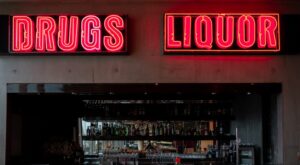
Even if you are clean and sober, you are being robbed by the toll substance abuse is taking on the American economy.
A new poll by KFF published last week reveals that of those surveyed, “Two-thirds say either they or a family member have been addicted to alcohol or drugs, experienced homelessness due to addiction, or experienced a drug overdose leading to an emergency room visit, hospitalization, or death.”
In addition, only 46 percent of those with an addiction or who have a family member with an addiction report seeking treatment. The result carries a hefty price for individuals and the economy. Here are just 10 reasons why it matters..
Lost Productivity and Employment Opportunities
One of the most immediate economic consequences of addiction is the loss of productivity in the workforce.
An estimated 70 percent of Americans who use illicit drugs are employed, according to a report by US Drug Test Centers. As a result, employers lose $25.5 billion in lost productivity. Another $25 billion is spent on related healthcare.
Healthcare Expenditures
Addicts often require medical treatment for various physical and mental health issues arising from their habits. The Centers for Disease Control and Prevention (CDC) reports that the costs of addiction-related healthcare, including emergency room visits, hospital stays, and rehabilitation, strain both personal budgets and government resources.
Legal Expenses
Addiction and legal problems often go hand-in-hand.
The American Bar Association reports that individuals with substance abuse issues are more likely to be involved in criminal activities. As a result, many addicts face ongoing legal expenditures.
Reduced Earnings Potential
Individuals grappling with addiction often find themselves unable to secure stable, well-paying jobs. Long-term substance abuse can diminish cognitive abilities, impair decision-making skills, and create a cycle of unemployment and underemployment. As a result, addicts can see their earnings decrease by as much as 40 percent, according to the Substance Abuse and Mental Health Services Administration (SAMHSA).
Strain on Social Services
In addition to physical healthcare, addiction can lead to increased mental health issues. Treatment for addiction is estimated at $600 billion.
In addition to treatment costs, there is an untold cost of funds diverted from other government programs. Those measures include unemployment benefits, housing assistance, and public healthcare.
Family Financial Instability
The KFF survey found that 51 percent of respondents worried that a family member might become an addict. SAMHSA reports that families that include an addict suffer greater financial stress and poverty as a result.
Many family members support their loved ones’ treatment or other costs, such as legal fees.
Impact on Education
The consequences of addiction can have long-lasting effects on education. Students struggling with substance abuse are more likely to drop out of school. As a result, they may limit their future earning potential.
Increased Crime Rates
Drug-related crimes contribute to the economic strain on both personal finances and the national economy. The costs associated with law enforcement, incarceration, and rehabilitation further drain public resources.
Addiction is a primary component of many crimes, according to the American Addiction Centers. An article on the ADC website reports that, “research indicates that up to 75% of individuals who begin treatment for a SUD report having engaged in physical assault, mugging, using a weapon to attack another person, and other violent crimes.”
Impact on Small Businesses
Addiction’s ripple effects extend to small businesses, which form the backbone of the U.S. economy. Employees struggling with addiction can lead to higher turnover rates, increased absenteeism, and reduced productivity for these businesses.
About nine percent of employees have an alcohol or drug use disorder, according to the National Safety Council. That amounts to 13.6 people. In addition, almost the same number, 13.4 million workers, are in recovery or have recovered from addiction.
Reduced Economic Output
The U. S. Department of Health and Human Services estimates that alcohol misuse costs the economy $249 billion. Further, illicit drug use adds another $193 billion to the tab.
Ultimately, the culmination of these factors results in a decreased economic output for the entire nation. Lost productivity, increased healthcare costs, strain on social services, and reduced consumer spending collectively contribute to an economic drag.
Read More:
Come back to what you love! Dollardig.com is the most reliable cash-back site on the web. Just sign up, click, shop, and get full cashback!

Max K. Erkiletian began writing for newspapers while still in high school. He went on to become an award-winning journalist and co-founder of the print magazine Free Bird. He has written for a wide range of regional and national publications as well as many on-line publications. That has afforded him the opportunity to interview a variety of prominent figures from former Chairman of the Federal Reserve Bank Paul Volker to Blues musicians Muddy Waters and B. B. King. Max lives in Springfield, MO with his wife Karen and their cat – Pudge. He spends as much time as possible with his kids, grandchildren, and great-grandchildren.
Comments